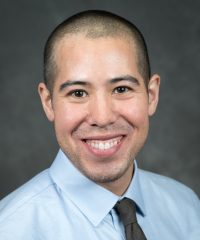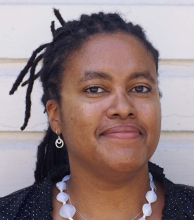About the Host

Dr. Nathaniel Chin is the creator and host of Dementia Matters. He is a geriatrician, memory clinic doctor, and medical director for the Wisconsin Alzheimer's Disease Research Center. His father's diagnosis with early onset Alzheimer’s disease inspired him to pursue a career as a geriatrician and scientist focused on dementia prevention, especially in regard to Alzheimer's disease.
Dementia Matters is a podcast about Alzheimer’s disease and other causes of dementia. Creator and host Dr. Nathaniel Chin interviews leading scientists and caregiving experts to bring listeners the latest in Alzheimer's disease news, research and caregiver resources.
Three Ways to Listen
You can listen to episodes through our website or subscribe to Dementia Matters through ApplePodcasts, Spotify, Podbean or wherever you get your podcasts. You can hear Dementia Matters on Fridays at 4 p.m. (CT) and again at 10 p.m. (CT) during the "Science Friday" segment on WMUU Radio, 102.9 FM in Madison, and streaming online.
Contact Us
Email your questions and episode suggestions to dementiamatters@medicine.wisc.edu.
Audio Editors: Eli Gadbury and Alexia Spevacek
Executive Producer: Caoilfhinn Rauwerdink
Producer: Amy Lambright Murphy
Make an Impact
Like what you’re hearing and learning? Make an impact when you make a tax-deductible gift to the Dementia Matters fund of the UW Initiative to End Alzheimer’s.
Recent Episodes
Guest: Dr. Amy Kind, MD, PhD, Associate Professor of Geriatrics, University of Wisconsin School of Medicine and Public Health, Director, VA Dementia Care Clinic, Investigator, Wisconsin ADRC
Social determinants of health play a big role in our overall well-being. Unfortunately, too often we fail to recognize the impacts that these factors have on our brains and overall health. Dr. Amy Kind and her research team at the University of Wisconsin developed a tool called the Neighborhood Atlas to visualize neighborhood disparities and help facilitate change.
Guest: Dr. Elizabeth Chapman, geriatrician at UW Health specializing in acute care geriatric medicine and delirium in hospitalized patients
Delirium can be caused by a range of conditions and can take on many different forms. One consistency, however, is its relation to an increased risk for developing dementia. Dr. Elizabeth Chapman speaks on the connections between these conditions and offers some useful tips to help prevent delirium

Guest: Dr. Cerise Elliott, Senior Research Program Analyst at the National Institute on Aging
Dr. Cerise Elliott gives a look at the structure and function of the National Institutes of Health and its work relating to Alzheimer’s Disease and dementia. She also emphasizes the importance of diversity in research and of recruitment and retention as Alzheimer’s disease-related research moves forward.
With the dramatic increase in life expectancy among people with Down syndrome over recent decades, it has been observed they develop Alzheimer’s disease at a much younger age and at a much higher incidence than the general population. Our guest, an expert on brain imaging and neurodegeneration, discusses the theories behind this relationship and the similarities and differences in how Alzheimer's disease progresses in the Down syndrome and general populations. Guest: Dr. Brad Christian, professor of medical physics and psychiatry at the University of Wisconsin
Research in dementia care has traditionally examined community and nursing home settings, leaving a gap in research on care for dementia patients during hospital stays. After identifying a need for improvement in caring for hospital patients with dementia, our guest developed a new approach that helps hospital staff better recognize dementia and address it. Guest: Dr. Andrea Gilmore-Bykovskyi, PhD, RN, Researcher, Assistant Professor of Nursing at the University of Wisconsin-Madison
The only true way to confirm a diagnosis of Alzheimer’s disease is through a brain autopsy after death, but advancements in neuroimaging are giving scientists a clearer picture of what’s happening in the brain while patients are still alive.
Guest: Samantha Allison, PhD, Researcher at the Wisconsin ADRC and WRAP study.
The William S. Middleton Memorial Veterans Hospital in Madison, Wisconsin, was recently recognized as the first Dementia Friendly VA hospital in the country. We hear from Dr. Mary Wyman and Margaret Flood on the importance of Dementia Friendly and what it takes to reach this designation. Guests: Dr. Mary Wyman, Clinical Psychologist, and Margaret Flood, Clinically Licensed Social Worker, VA Caregiver Support Coordinator
Alzheimer's disease-related changes occur in the brain more than 15 years before a person experiences the memory and personality changes associated with the disease. By studying the disease in its earliest stages, scientists hope to find treatments that can prevent or delay the onset of dementia and memory loss. Guest: Sterling Johnson, PhD, Clinical Neuropsychologist, Professor of Geriatrics, University of Wisconsin School of Medicine and Public Health, Associate Director of the Wisconsin Alzheimer's Disease Research Center, Principle Investigator of the Wisconsin Registry for Alzheimer's Prevention (WRAP) Study
As we age, swallowing foods and liquids can become harder to do. When someone has trouble swallowing, it is defined as dysphagia. Dr. Nicole Pulia discusses dysphagia and its signs, effects, treatments, and relation to Alzheimer’s disease. Guest: Nicole Pulia, PhD, CCC-SLP, Assistant Professor of Geriatrics, University of Wisconsin School of Medicine and Public Health
After a diagnosis of Alzheimer’s disease or other dementia, patients and caregivers can turn to local agencies and associations for education and support. Dementia friendly communities represent an international movement to help businesses, the general public, and government agencies better recognize and support people living with dementia. Guest: Joy Schmidt, dementia care specialist, Aging and Disability Resource Center of Dane County
Veterans are at a higher risk for Alzheimer’s disease than the general population. A new clinical trial is looking at the effect prescription fish oil has on brain health in veterans and will determine whether the supplement could be used as an effective prevention treatment for the disease. Guest: Cynthia Carlsson, MD, MS, geriatrician, William S. Middleton Memorial Veterans Hospital, and investigator, Wisconsin Alzheimer’s Disease Research Center
The thought of going in for a memory evaluation can be intimidating. Learn more about what you can expect with the evaluation process and get an idea of which behaviors are more concerning than others. In addition, learn why online assessments fall short when it comes to properly diagnosing memory concerns. Guest: Lindsay Clark, PhD, neuropsychologist, UW Health Memory Assessment Clinic, and investigator, Wisconsin Alzheimer's Disease Research Center
Dementia care specialist Teepa Snow discusses techniques caregivers and family members can use to better communicate with Alzheimer’s disease and dementia patients. Guest: Teepa Snow, dementia care specialist, educator, founder of Positive Approach, LLC
On behalf of the entire Dementia Matters team, thank you for listening to our podcast, and have a happy new year!
How does hormone replacement therapy affect a woman’s risk for developing Alzheimer’s disease? Dr. Carey Gleason, a researcher at the Wisconsin Alzheimer’s Disease Research Center, joins us to offer her insight on menopausal hormone therapy and the many factors patients and their physicians should consider in the decision-making process. Guest: Carey Gleason, PhD, Clinical Psychology, Associate Professor and Researcher, Wisconsin Alzheimer’s Disease Research Center
Examining the bacteria that live in our guts and the role it plays in health is an exciting frontier in scientific inquiry. Researchers are now looking at the gut microbiome for answers about Alzheimer’s disease. Guest: Nick Vogt, MD PhD Student, Wisconsin School of Medicine and Public Health, Research Investigator, Wisconsin Alzheimer’s Disease Research Center
Sleep plays an important role in our day-to-day lives and has a huge impact on our memory and thinking. Learn more about why we need to sleep and some of the negative impacts that poor sleep can have on our brains. Guest: Steven Barczi, MD, Geriatric Sleep Physician, University of Wisconsin School of Medicine and Public Health
Recent research shows Alzheimer’s disease can be present up to two decades before symptoms occur; a phenomenon known as preclinical Alzheimer’s disease. Comparing the disease to a burning building, some scientists believe treatment needs to happen well before significant foundational damage occurs. Guest: Paul Aisen, MD, Professor of Neurology and Director of the Alzheimer’s Therapeutic Research Institute, Keck School of Medicine, University of Southern California
The MIND diet was created with the goal of healthy brain aging. This nutrition plan, which is backed up by years of scientific research, details 10 food groups you should incorporate into your diet and five foods that you should limit. Guest: Martha Clare Morris, ScD, Professor of Epidemiology, Rush University Medical Center, and co-creator of the MIND Diet
The Wisconsin Alzheimer's Disease Research Center is one of about 30 federally supported Alzheimer's Disease Centers in the country. Dr. Sanjay Asthana explains what makes the Wisconsin ADRC unique, the national effort to end Alzheimer’s disease, and the future of disease research. Guest: Sanjay Asthana, MD, associate dean of gerontology, University of Wisconsin School of Medicine and Public Health, and director and founder, Wisconsin Alzheimer's Disease Research Center
Recent research shows lifetime stressful events, such as divorce, childhood trauma, and military combat, can have negative consequences for brain health and cognition in later life. Guest: Megan Zuelsdorff, PhD, researcher, University of Wisconsin-Madison
In this episode, we’re fortunate enough to be joined by Dr. Sanjay Asthana, the director and founder of the Wisconsin Alzheimer’s Disease Research Center. Dr. Asthana has published extensive research in the field of hormones and brain health and will be discussing some of his work, which looks at the gender differences that exist in Alzheimer’s disease.
Marion Chapin, an expert in homecare for seniors and people with dementia, will share five signs it is time to seek in-home help for caregiving for a family member. Marion has been working in homecare for more than 40 years, including time as a live-in caregiver for her own parents. Guest: Marion Chapin, training and outreach coordinator, Senior Helpers
Recent research from the Wisconsin Alzheimer’s Disease Research Center has shown the protective benefits of exercise in maintaining brain health and preventing Alzheimer's disease. Guest: Ozioma Okonkwo, PhD, assistant professor, Division of Geriatrics, University of Wisconsin School of Medicine and Public Health, and neuropsychologist, UW Health Memory Clinic




